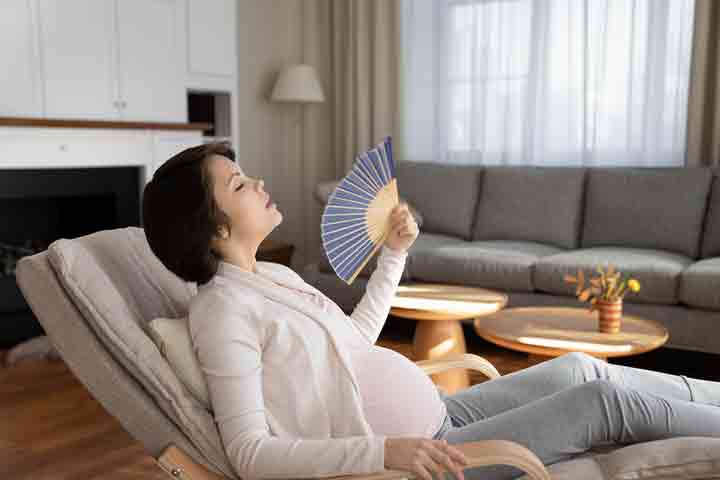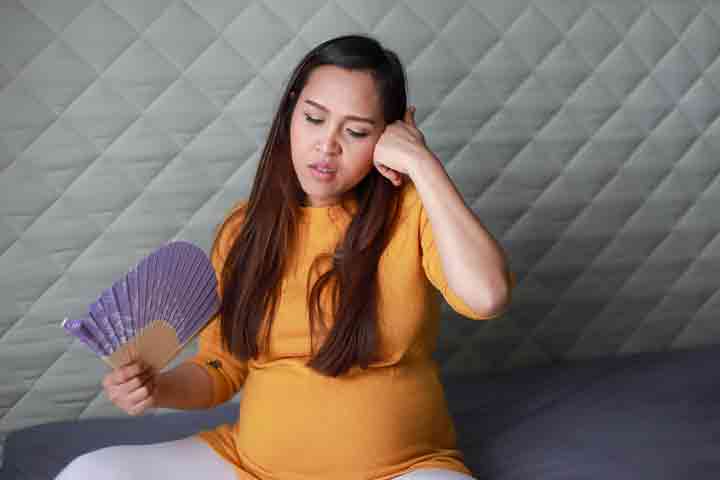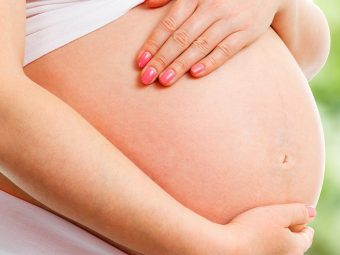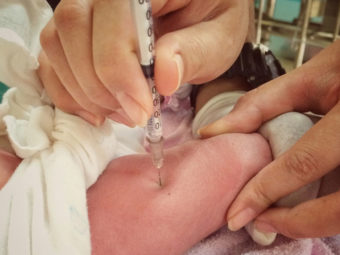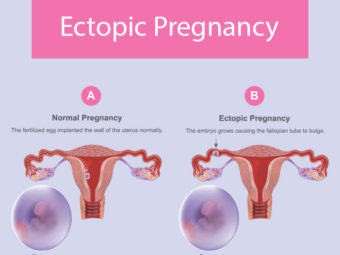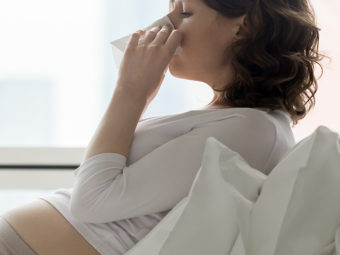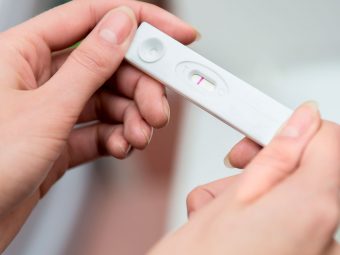
Image: Shutterstock
Hormonal changes can be the culprit of excess sweating during pregnancy. Most women experience sweating more than usual in pregnancy. A slight increase in temperature can make a pregnant woman feel hot and sweat a lot. Although it is uncomfortable, sweating is not a cause for concern in pregnancy. You can drink more water to compensate for the water loss through sweating.
Read on to know more about sweating during pregnancy and ways to deal with it.
When Does Excessive Sweating Start During Pregnancy?
You may experience sweating throughout the pregnancy. An increase in body temperature during pregnancy might result in sweating. Sweating is nature’s way of helping the body to regulate its temperature. HypothalamusiXPart of the brain that produces hormones involved in various body functions such as regulating heart rate, mood, sleep, and hunger controls body temperature. During pregnancy, the body temperature increases slightly which is a natural byproduct of the growing baby. Hormonal changes, increased blood volume, and weight gain contribute to this phenomenon.
Excessive sweating is experienced more during the night than during the day. And this condition is termed as sleep hyperhidrosis or night sweats (1), which is usually considered as one of the symptoms of menopauseiXTermination of a woman’s menstrual cycle in a woman due to a decrease in reproductive hormones . However, in the case of pregnant women, it could be due to a sudden rise and fall of the pregnancy hormones, estrogeniXA hormone responsible for the development and functioning of female reproductive organs , and progesteroneiXA female reproductive hormone that plays an essential role in menstruation, pregnancy, and breastfeeding (2).
There could be various reasons for excessive sweating during pregnancy.
What Are The Causes Of Sweating/ Excessive Sweating During Pregnancy?
Some women may have sweating during the day while others at night. A few may sweat during the day and night too. Below are some of the common reasons why you could sweat during pregnancy:
- Increased metabolism: During pregnancy, the mother’s body burns more calories and generates more heat. Therefore, the body needs more energy for maintaining its functions and supporting the growing baby. This, in turn, is believed to activate sweat glands, resulting in perspiration.
Image: Shutterstock
- Hyperthyroidism: If you have hyperthyroidism during pregnancy, you might experience higher body temperature and excessive sweating anytime during the day and night (3). The condition could continue postpartum as well. Hypothyroidism is abnormal medical condition, which may speed up heart rate and body systems causing excessive sweating and other symptoms.
- Low blood sugars: A condition called hypoglycemiaiXA condition characterized by a fall in blood sugar levels to lower than the normal range during pregnancy could also make you sweat (4).
- Medications: Sweating is a side effect of some medications. Taking certain medicines such as antipyreticsiXA class of medications used to reduce fever by reducing body temperature and antihypertensivesiXA class of medications employed to treat high blood pressures could result in excessive sweating (5).
- Increased blood flow: More blood circulates in the body during pregnancy, which makes your body warmer, and could result in increased sweating (6). By the begging of third trimester, the blood volume may increase about 50%
 Did you know?
Did you know?- Infections: A fever or other illness like a urinary tract infection during pregnancy may cause an increase in body temperature (7).
- High levels of progesterone: During pregnancy, the levels of the hormone progesterone go up. This may increase body temperature, which might result in sweating (8).
- Changing hormones: These changes are responsible for various pregnancy symptoms and discomforts, including a slight rise in body temperature
Image: Shutterstock
- Weight gain: When the pregnant woman gains extra weight, especially in the third trimester, she makes an extra effort to move and this generates more heat. The body’s center of gravity changes continuously, making the body work harder to keep its balance, causing more sweating
- Weather: When you spend time outdoors in hot, humid weather.
- Physical activity: When you exercise or participate in any activity that strains your body.
- Anxiety: Sweating is a natural response to anxiety.
- Others: Eating spicy food or consuming caffeinated beverages
Irrespective of the cause of sweating, there are a few ways that could help manage it and avoid the discomfort.
How To Deal With Excessive Sweating In Pregnancy?
While you cannot entirely avoid sweating during pregnancy, you could follow some simple tips to reduce the severity and discomfort.
- Avoid going out in hot weather: Do not step out in the sun as high temperatures could worsen the sweating. Even if you are exercising, schedule it either in the mornings or evenings. In addition to this, wear light-colored, soft, and airy clothes.
Image: Shutterstock
- Bring in some changes in your food: Avoid spicy food and hot drinks that might increase your body temperature. Increase the consumption of water and fluids to stay hydrated and beat the heat.
- Treat infections in time: If you have any illness or infections, see that you are getting it treated on time. Do not delay a visit to the doctor. You may also ask your doctor if any medicine you are using could cause sweating as a side effect.
- Notice changes: Most of the time, hormonal imbalance causes sweating during pregnancy. Keep noticing the changes in your body, and let your doctor know about them. They might suggest dietary changes.
- Others: You could also use talc-free powder if you are sweating excessively. This might not reduce sweating but could absorb the excess moisture.
These tips could help you manage sweating during pregnancy. However, the condition may not end right away. It might continue after the delivery as well. Nevertheless, it tends to go away with time.
Although it is not a harmful condition, sweating could become a major discomfort and would need medical intervention in some cases.
 Quick tip
Quick tipWhen Should You Consult The Doctor?
Image: Shutterstock
If you are sweating profusely, even when the weather is pleasant and cool, tell your doctor about it. Also, fever, increased heart rate, and too much discomfort accompanied by sweating should be reported. The doctor will examine your symptoms and advise you accordingly.
In the next section, we answer some of your common concerns about sweating during pregnancy.
Frequently Asked Questions
1. Is sweating an early symptom of pregnancy?
Sweating could be one of the common and early symptoms of pregnancy. Fluctuation in the hormones and increased metabolism may increase your body’s temperature, resulting in sweating.
2. Are night sweats dangerous during pregnancy?
Generally, night sweats are not considered to be dangerous, although they might disturb your sleep. But when you have symptoms such as itching, rashes or fever along with sweating, then you may report this to the doctor.
3. How long do pregnancy night sweats last?
The duration of night sweats during pregnancy varies based on your medical history and other causes that could trigger excessive perspiration during pregnancy. You might notice it in the first and last stages of pregnancy, but sometimes it may continue after childbirth too.
4. How long do pregnancy sweats last?
Pregnancy sweats might start in the first trimester and continue after delivery. A study published in the National Library of Medicine stated that pregnancy sweats might persist for three months after pregnancy (9).
A slightly increased body temperature along with weight gain and hormonal changes may increase sweating during pregnancy. Dietary changes, higher metabolic rate, anxiety, and conditions such as hyperthyroidismiXA condition marked by excess thyroid hormones in the body, leading to weight loss, increased heart rate, and other symptoms and hypoglycemia may also increase sweating. You cannot avoid it but could reduce it if you maintain proper hydration, avoid spicy food and caffeinated drinks, and restrict venturing out in hot weather conditions. Check with your doctor if you experience excessive sweating even in ambient conditions and have additional symptoms such as fever or increased heart rate.
Infographic: Foods To Keep You Hydrated During Pregnancy
Excessive sweating during pregnancy leads to discomfort and increases the risk of dehydration. We present a list of food items with high water content, ensuring adequate hydration. Make sure to save this infographic so that you can add these items to your grocery list for the next time. Illustration: Momjunction Design Team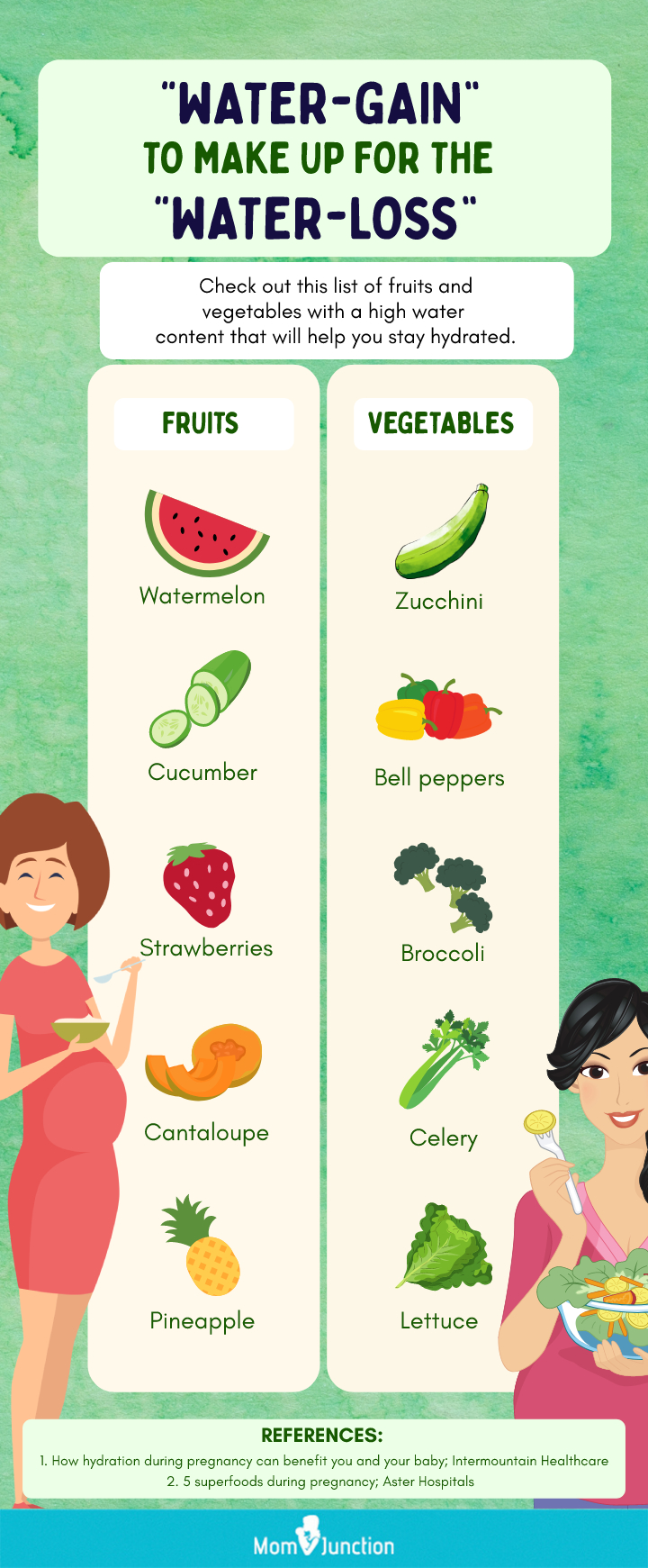
Get high-quality PDF version by clicking below.
Download Infographic
Key Pointers
- During pregnancy, the body temperature increases slightly, resulting in sweating.
- There can be other contributing factors such as hormonal changes, increased metabolism, increased blood flow, and low blood sugar.
- Measures such as avoiding going out in hot weather, decreasing spicy food, and proper water intake may help manage sweating during pregnancy.
- Consult a doctor if you are sweating irrespective of the weather or have a fever and increased heart rate.
References:
2. Menopause; Baylor College of Medicine
3. Hyperthyroidism during pregnancy; Chu Sainte-Justine (2017)
4. Gestational Diabetes: A Guide for Pregnant Women; Oregon Health & Science University (2009)
5. A. J. Viera, M. M. Bond, and S. W. Yates; Diagnosing Night Sweats; American Family Physician (2003)
6. Common health problems in pregnancy; NHS UK
7. Urinary tract infection – adults; Allina Health
8. Regulation of Body Temperature; Antranik Strength & Flexibility Expert
9. T W Hartgill et al; Core body temperature and the thermoneutral zone: a longitudinal study of normal human pregnancy; National Library of Medicine.
9. Hot weather and high body temperature during pregnancy; NCT




